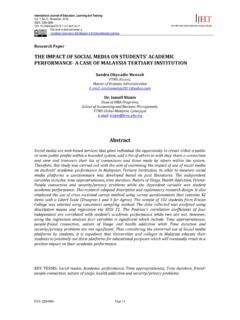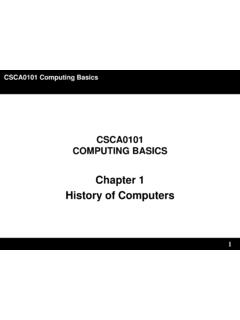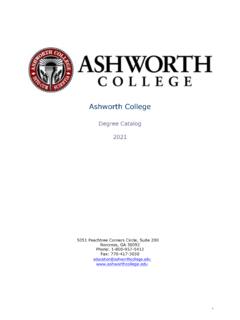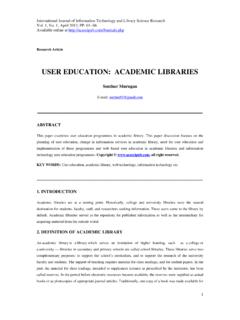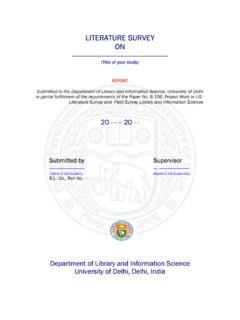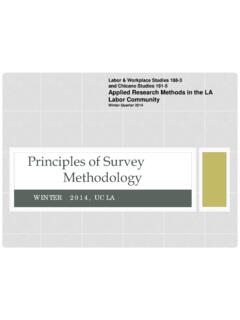Transcription of Research Paper EFFECTS OF INTERNET ON THE ACADEMIC ...
1 ISSN: 2289-6694 Page 57 International Journal of Education, Learning and Training Vol. 2 ( ), November, 2017 ISSN: 2289-6694 DOI: 24924/ This work is licensed under a Creative Commons Attribution International License. Research Paper EFFECTS OF INTERNET ON THE ACADEMIC PERFORMANCE OF TERTIARY INSTITUTIONS STUDENTS IN NIGER STATE, NIGERIA Mohammed Abdullahi Jibrin Department of Computer Science, Federal College of Education, Kontagora, Muhammad Ndagie Musa Department of Computer Science, Federal College of Education, Kontagora, Tahiru Shittu Department of Multimedia, Faculty of Computer Science & Information Technology, University Putra Malaysia, 43400 Serdang, Selangor, Malaysia Abstract This Research work investigates the EFFECTS of INTERNET on the ACADEMIC performance of students in tertiary institutions within Niger state, Nigeria.
2 Five Research questions were formulated to guide the study. The Research design adopted was the survey method using questionnaires as the instrument of data collection. Three institutions were selected and sample of 300 students was randomly selected from these institutions. A questionnaire was distributed for data generation. Data collected were analysed using descriptive statistics. The finding reveals that INTERNET is one of the beneficial tools in this era of Information and Communication Technology (ICT) used in ACADEMIC exercise. The study also revealed some of the problems encountered in the usage of INTERNET which include slow INTERNET speed and lack of stable power supply. It was recommended among others that the school management should embark on awareness programmes that will sensitize the students to take the advantages derived from the use of the INTERNET for ACADEMIC purpose.
3 Keywords: ACADEMIC , Performance, Computer, Network, INTERNET , InstitutionISSN: 2289-6694 Page 58 Introduction The use of technology is changing the way things are done, including the work in tertiary institutions where the teaching and learning process required a great deal of improvement. Knowing fully that INTERNET is an essential tool for facilitating ACADEMIC activities in tertiary institutions in Nigeria, for a number of years now, the managers of these tertiary institutions of learning have invested heavily in establishing INTERNET services in their schools. The services provided by INTERNET have had a major impact in the university context, in organisation and in teaching and learning methods. The INTERNET has made computers across the globe interconnected.
4 According to Emeka and Nyeche (2016) the INTERNET today is a worldwide entity whose nature cannot be easily or simply defined. To many, the INTERNET is a large computer network linking together millions of smaller computers at numerous sites in various countries belonging to thousands of business, government, Research , educational and other organisations. To the INTERNET users, the INTERNET is a global community-one with a very active life. In today world, the INTERNET plays a vital role in the teaching, Research and learning process in ACADEMIC institutions. Thus, the advent of the INTERNET has heralded the emergence of a new form of knowledge production and distribution the soft form. This new form of information resources have as their greatest advantage, a virtually unlimited wealth of information resources which is widely readily available and accessible to hundreds of millions of people simultaneously in many parts of the world (Kumar & Kaur 2006).
5 In addition, Amaoge and Igwebuike (2016) believe that the INTERNET has increasingly become an invariable asset in education in terms of learning, teaching and Research . The use of INTERNET in the tertiary institutions is an exciting prospect especially when the rugged terrain is the significant impediment to obtain information for the vast majority of people. Fasae and Aladeniyi (2012) pinpoint that for the developing countries like Nigeria to grow and attain its economic and social status; such country must be fully ready in strengthening and empowering its ACADEMIC institutions, both in science and technological capacity. Hence, the students in their respective fields will need an array of reliable and interactive means of accessing and retrieving information without wasting much time. Similarly, the use of this INTERNET is greatly dependent on some associated factors such as purposes, students experience, locations, INTERNET facilities and services available, among others on ACADEMIC pursue of the students in their institutions.
6 Statement of the Problem Students of tertiary institutions in Nigeria employ the INTERNET in educational matters such as writing papers, searches for answers to questions and communicating with classmates on homework. However, time spent in activities where surfing the net occurs could substitute away from time allocated to reading, studying and completing homework. This may hurt ACADEMIC performance in the short term. So, the study assessed the effectiveness of the use of INTERNET services and its EFFECTS on students ACADEMIC performances. ISSN: 2289-6694 Page 59 Objective of the Study The main objective of this study is to find out the use of INTERNET service and its EFFECTS on student s performances. Specifically, the aims of the study are to: i.
7 Examine the effect of INTERNET use on the ACADEMIC performance of the students. ii. Investigate the problems that militate against the student s access to the INTERNET . iii. Investigate the frequency of INTERNET use among students. Research Questions The following Research questions were formulated to guide this study: i. What is the frequency of INTERNET use among the students? ii. How useful is the INTERNET to students in their daily ACADEMIC activities? iii. Which is the most used INTERNET service? iv. Do the INTERNET services influence students ACADEMIC performance? v. What are the problems faced by students in using INTERNET services? Literature Review According to Oghenetega and Igere (2014), over the years, the INTERNET has been a very important instrument for facilitating ACADEMIC activities in tertiary institutions in Nigeria. The information and communication technology revolution is sweeping through the world and the gale has even caught up with developing countries like Nigeria.
8 INTERNET can broadly be defined as worldwide network of computers communicating via an agreed upon protocol (rules for exchange of information). It provides access to the most diversified source of information hosted by individuals and various organisation worlds wide on a vast network of servers (Ogungbeni, et al, 2016). Various studies have found that INTERNET use can have positive benefits on educational achievement (Chen & Fu, 2009). One puzzling question is the effective impact of the INTERNET on student performance. Ogedebe (2012) conducted a Research at university of Maiduguri Nigeria on students ACADEMIC performance and INTERNET usage. A questionnaire was designed and administered to students. The analysis showed that most of the respondents were computer literate, since 65% of the respondents agreed that they are computer literate, while 29% were not, 6% of the respondents neglected the question.
9 The investigation also shows that 79% of the respondents accepted that their ACADEMIC performance actually improved by using the INTERNET , as 13% thought otherwise, 8% made no response to that question. When respondents were asked on how INTERNET services have helped their ACADEMIC pursuit? The study shows that 8% believed that their GPA has improved remarkably as a result of the use of the INTERNET , 6% of the respondents agreed that their GPA has been declining, 28% responded that it aids them in preparing better for CA and semester examinations, while 22% were indifferent about the options and therefore did not respond. Majority of the respondents constituting 36% of the total respondents refused to respond to the question. A similar Research was conducted by Luambano and Nawe (2004) on INTERNET Use by Students of the University of Dar es Salaam.
10 The study was to determine if students were using the INTERNET for ACADEMIC purposes, investigate the level of students access to the INTERNET , as well as the problems students faced in INTERNET use. The survey method was used as the basic method for data collection. The study revealed that the level of students access to the INTERNET was low, and the major reason was that at the time of the study, computers with INTERNET ISSN: 2289-6694 Page 60 facilities were inadequate. The findings also revealed that the students who had access to the INTERNET were not using it effectively. They used it mainly for communication with friends and relatives more than for ACADEMIC purposes. The cause of this was found to be lack of skills required for effective use of the INTERNET .
